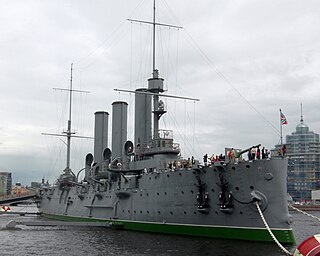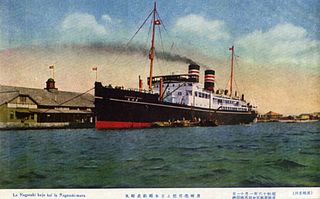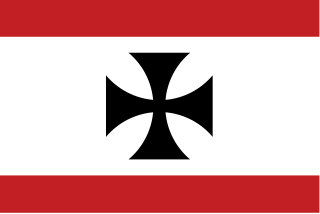Related Research Articles

A ship is a large watercraft that travels the world's oceans and other sufficiently deep waterways, carrying cargo or passengers, or in support of specialized missions, such as defense, research, and fishing. Ships are generally distinguished from boats, based on size, shape, load capacity, and purpose. Ships have supported exploration, trade, warfare, migration, colonization, and science. After the 15th century, new crops that had come from and to the Americas via the European seafarers significantly contributed to world population growth. Ship transport is responsible for the largest portion of world commerce.

Maritime transport and hydraulic effluvial transport, or more generally waterborne transport, is the transport of people (passengers) or goods (cargo) via waterways. Freight transport by sea has been widely used throughout recorded history. The advent of aviation has diminished the importance of sea travel for passengers, though it is still popular for short trips and pleasure cruises. Transport by water is cheaper than transport by air, despite fluctuating exchange rates and a fee placed on top of freighting charges for carrier companies known as the currency adjustment factor. Maritime transport accounts for roughly 80% of international trade, according to UNCTAD in 2020.

Otto Hahn was one of only four nuclear-powered cargo vessels built to date. Planning of a German-built trade and research vessel to test the feasibility of nuclear power in civil service began in 1960 under the supervision of the German physicist Erich Bagge. Launched in 1964, her nuclear reactor was deactivated fifteen years later in 1979 and replaced by a conventional Diesel engine room. The ship was scrapped in 2009.

A museum ship, also called a memorial ship, is a ship that has been preserved and converted into a museum open to the public for educational or memorial purposes. Some are also used for training and recruitment purposes, mostly for the small number of museum ships that are still operational and thus capable of regular movement.

The Canadian Hydrographic Service (CHS) is part of the federal department of Fisheries and Oceans Canada and is Canada's authoritative hydrographic office. The CHS represents Canada in the International Hydrographic Organization (IHO).

A merchant ship, merchant vessel, trading vessel, or merchantman is a watercraft that transports cargo or carries passengers for hire. This is in contrast to pleasure craft, which are used for personal recreation, and naval ships, which are used for military purposes.

The modern terms short-sea shipping, marine highway, and motorways of the sea, and the more historical terms coastal trade, coastal shipping, coasting trade, and coastwise trade, all encompass the movement of cargo and passengers mainly by sea along a coast, without crossing an ocean.
Norddeutscher Lloyd was a German shipping company. It was founded by Hermann Henrich Meier and Eduard Crüsemann in Bremen on 20 February 1857. It developed into one of the most important German shipping companies of the late 19th and early 20th centuries, and was instrumental in the economic development of Bremen and Bremerhaven. On 1 September 1970, the company merged with Hamburg America Line (HAPAG) to form Hapag-Lloyd AG.

The German Maritime Museum is a museum in Bremerhaven, Germany. It is part of the Gottfried Wilhelm Leibniz Scientific Community. The main museum building was opened on 5 September 1975 by then-president of Germany Walter Scheel, though scientific work already had started in 1971. In 2000, celebrating the 25th anniversary of the museum, the Hansekogge, a ship constructed around 1380 that was found in the Weser river in 1962, was presented to the public after having undergone a lengthy process of conservation in a large preservative-filled basin.

A shipping line or shipping company is a company whose line of business is ownership and operation of ships.
The International Commission for Maritime History (ICMH) was established in 1960 to promote international cooperation and the exchange of ideas in the field of maritime history. It is affiliated with the International Committee of Historical Sciences.
David John Starkey is a specialist in eighteenth- and nineteenth-century British maritime history. His research focuses on shipping, seafaring, privateering, fisheries and marine environmental history.

The Nisshin Maru (日新丸) is the primary vessel of the Japanese whaling fleet and is the world's only whaler factory ship. It was the research base ship for the Institute of Cetacean Research for 2002 to 2007. It has a tonnage of 8,145 GT and is the largest member and flagship of the five-ship whaling fleet, headed by leader Shigetoshi Nishiwaki. The ship is based in Japan in Shimonoseki harbor and is owned by Tokyo-based Kyodo Senpaku, which is a subsidiary of the Institute of Cetacean Research.
The Barcelona Charter, in full the European Charter for the Conservation and Restoration of Traditional Ships in Operation is an informal but widely accepted standard for maintenance and restoration projects on historic watercraft that are still in operation as active sailing vessels.

Bremerhaven is a city at the seaport of the Free Hanseatic City of Bremen, a state of the Federal Republic of Germany.
Ralph K. Pedersen is a nautical archaeologist from Levittown New York, United States. He was the DAAD Gastdozent für Nautische Archäologie at Philipps-Universität Marburg 2010–2013, and has been distinguished visiting professor in anthropology and Knapp Chair in Liberal Arts at the University of San Diego, and the Whittlesey Chair Visiting Assistant Professor in the department of history and archaeology at the American University of Beirut. He has been teaching online courses in archaeology in the History Department at Southwestern Assemblies of God University since 2009.

DDG Hansa, short for Deutsche Dampfschiffahrts-Gesellschaft Hansa was a major German shipping company specialising in heavy freight and scheduled traffic between Europe and the Far East. Founded in Bremen in 1881, the company declared bankruptcy in 1980.
The Australian Association for Maritime History (AAMH) is an Australian maritime history organisation. It publishes a journal, a newsletter and organises conferences.
Das Große Bremen-Lexikon is an 18th-century encyclopaedia by the Freie Hansestadt Bremen, written by Herbert Schwarzwälder about
References
- ↑ "Department Chairs".
- ↑ Informationsdienst Wissenschaft
- ↑ "Fellows at the HWK". Archived from the original on 2009-07-26. Retrieved 2008-05-29.
- ↑ "News at Old Dominion University". Archived from the original on 2012-03-07. Retrieved 2010-07-31.
- ↑ "Blaydes Maritime Centre". www.hull.ac.uk. Retrieved 2021-01-19.
- ↑ "Rachel Carson Fellow". Archived from the original on 2011-09-11. Retrieved 2011-01-23.
- ↑ Uni-Protokolle
- ↑ Archived 2007-06-30 at the Wayback Machine Report on future research topics for world history
- ↑ "MARI at Old Dominion University". Archived from the original on 2014-05-29. Retrieved 2014-05-28.
- ↑ "ICHS: Commission Internationale d'Histoire Maritime". Archived from the original on 2007-08-10. Retrieved 2011-01-07.
- ↑ "Ingo Heidbrink – ICOMOS International Polar Heritage Committee" . Retrieved 2020-10-22.